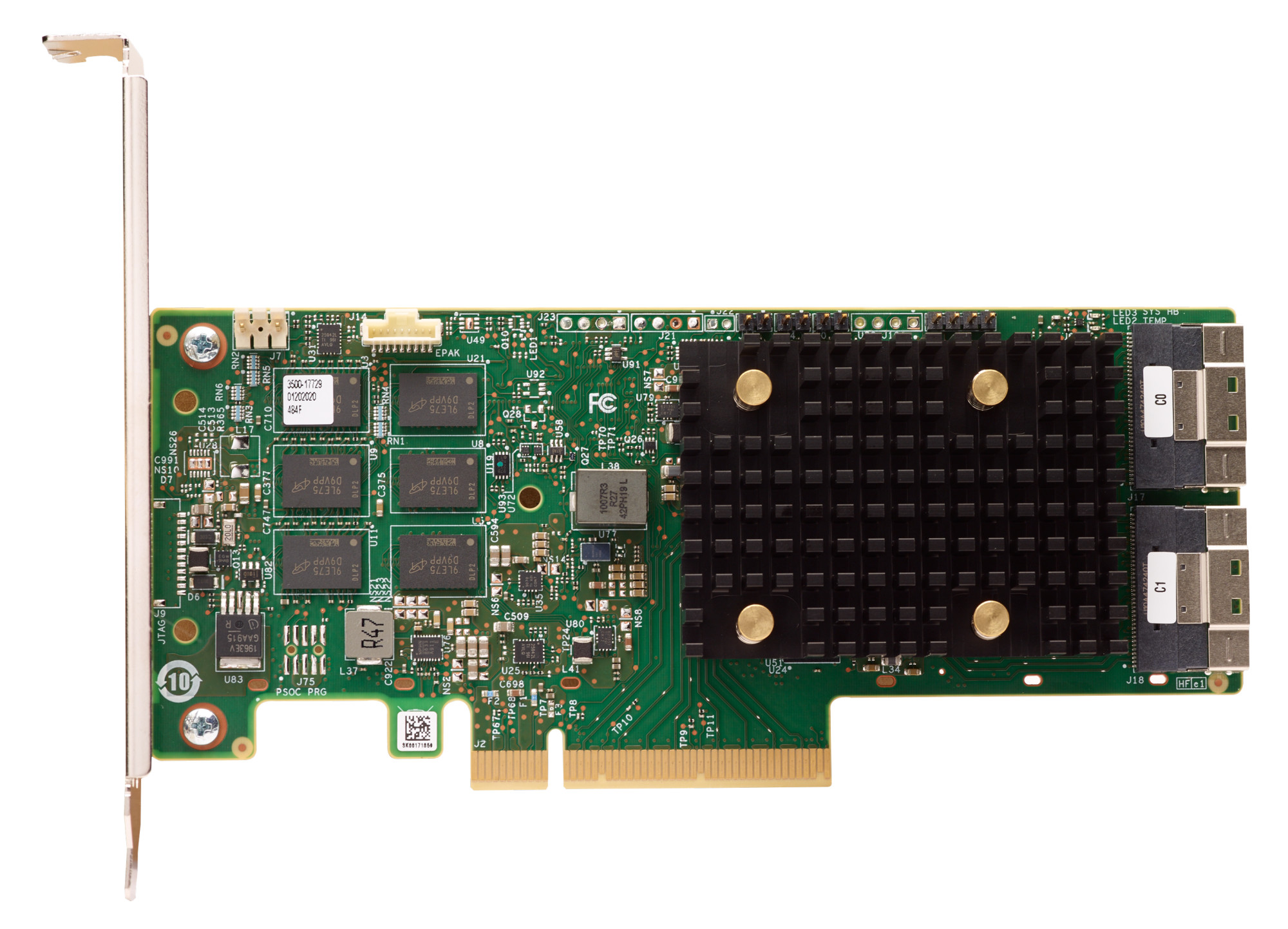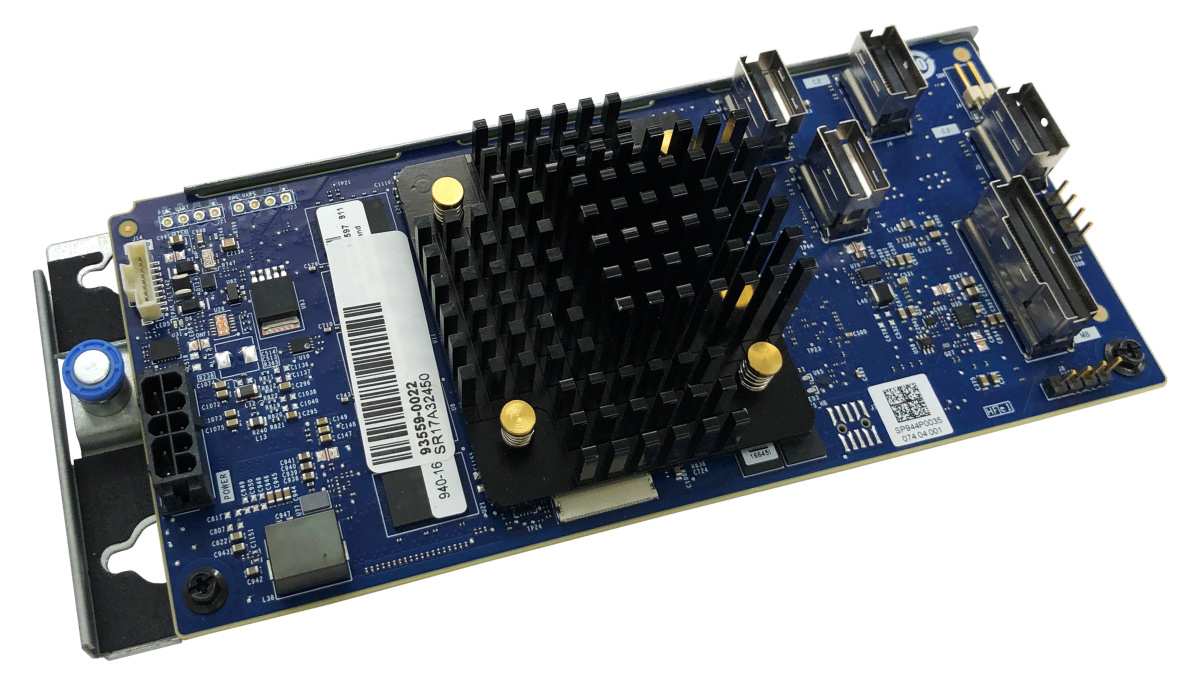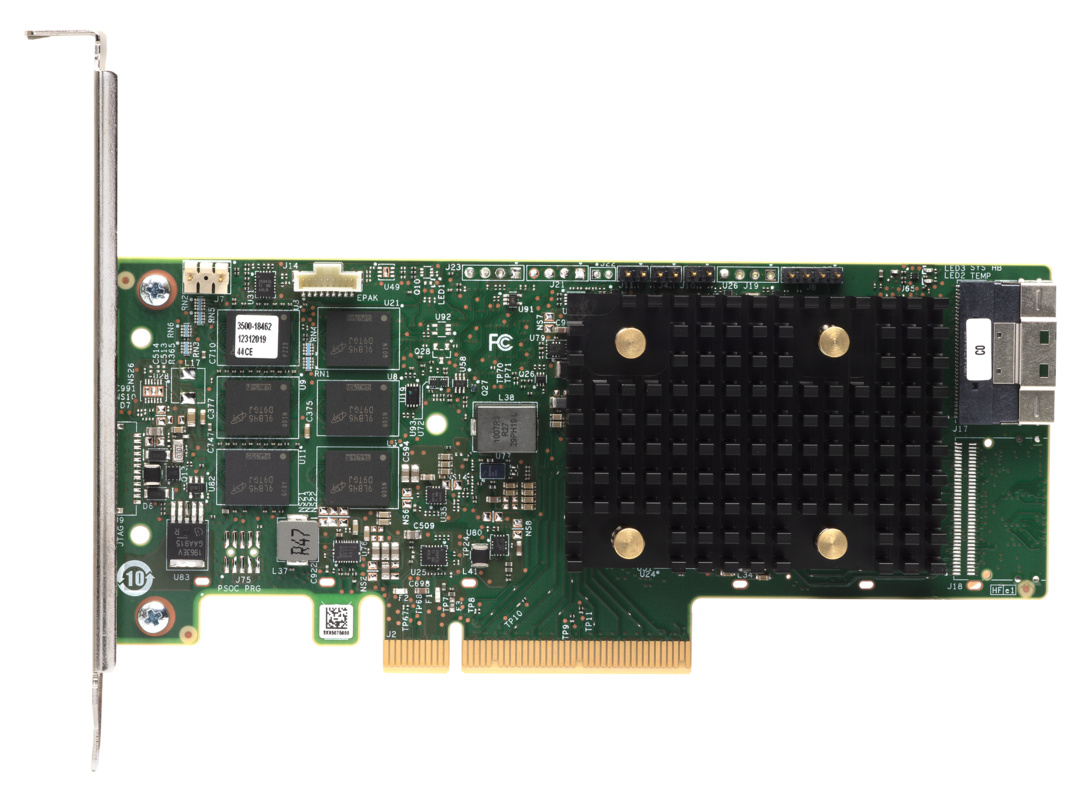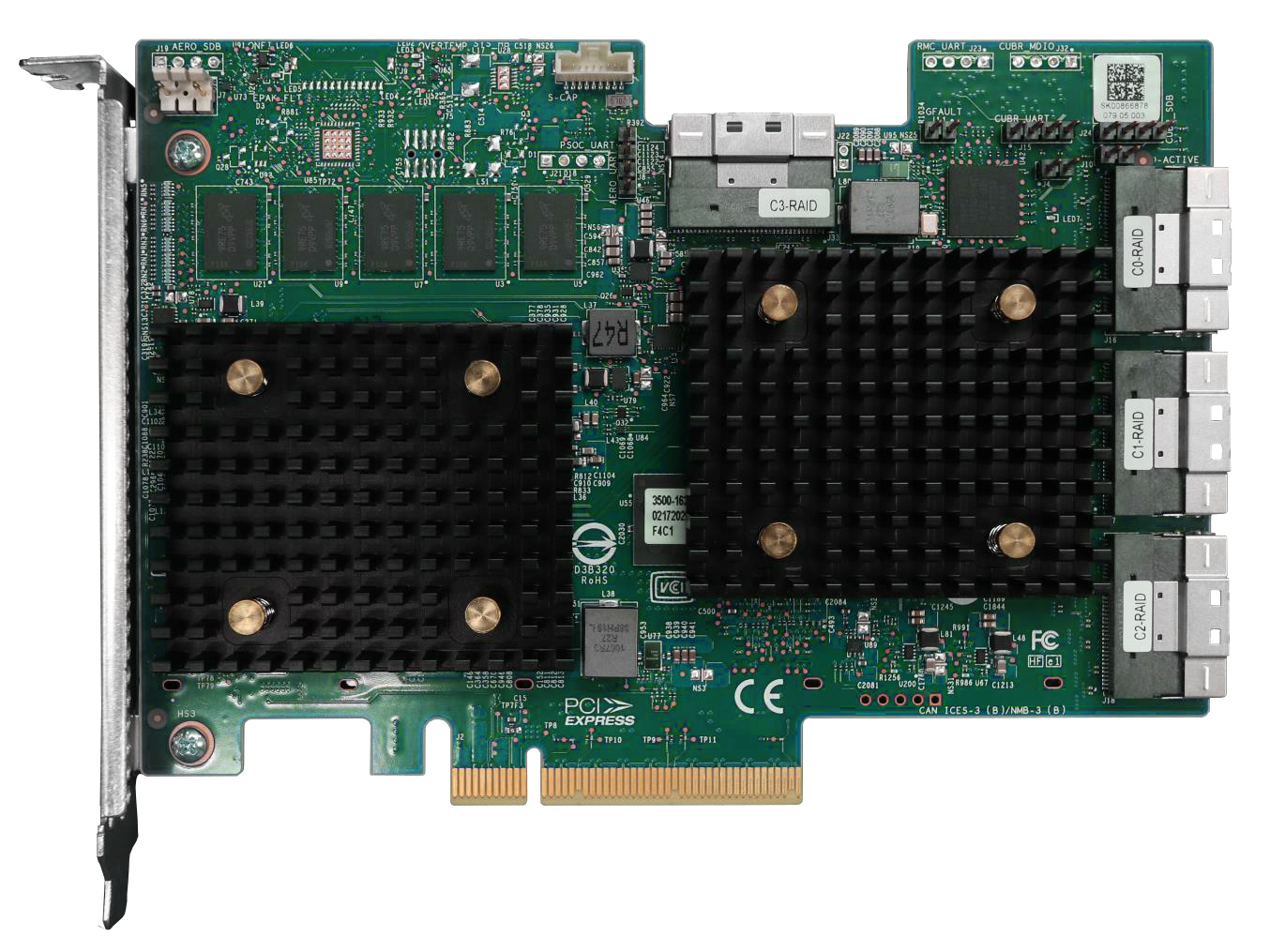Author
Updated
3 Sep 2025Form Number
LP1282PDF size
53 pages, 9.3 MBAbstract
The ThinkSystem RAID 940 family of PCIe 4.0 12 Gbps SAS RAID controllers are high-performance RAID-on-chip (ROC) adapters for connectivity to drives internal to the server. These adapters support RAID levels 0, 1, 10, 5, 50, 6 and 60, and include an extensive list of RAS and management features.
This product guide provides essential presales information to understand the ThinkSystem RAID 940-8i, 16i and 32i adapters and their key features, specifications, and compatibility. This guide is intended for technical specialists, sales specialists, sales engineers, IT architects, and other IT professionals who want to learn more about the adapters and consider their use in IT solutions.
Change History
Changes in the September 3, 2025 update:
- Added the feature code for NVMe x4 connectivity - Part number information section
- Clarified the support for Tri-Mode and NVMe x4 connectivity
- Technical specification section
- Features section
- Server support section
Introduction
The ThinkSystem RAID 940 family of PCIe 4.0 12 Gbps SAS RAID controllers are high-performance RAID-on-chip (ROC) server adapters for connectivity to drives internal to the server. These adapters support RAID levels 0, 1, 10, 5, 50, 6 and 60, and include an extensive list of RAS and management features.
Most RAID 940 adapters support Tri-Mode which enables the use of SAS, SATA and NVMe U.3 drives where each drive has a x1 connection to the adapter. On some servers, the 940-16i also supports an NVMe-only configuration, where each NVMe U.2 drive connects using a x4 connection.
The ThinkSystem RAID 940-16i is shown in the following figure.

Figure 1. ThinkSystem RAID 940-16i Flash PCIe Gen4 12Gb Adapter
Did you know?
RAID on Chip-based controllers such as the RAID 940 adapters have a dedicated processor that offloads all RAID functions from the server's CPU. With hardware acceleration for RAID 5 and 6 operations plus up to 8 GB dedicated memory for caching, the 940-8i, 16i and 32i offer the ultimate performance for ThinkSystem servers.
Most of the RAID 940 adapters support NVMe through a feature named Tri-Mode. This feature enables the use of NVMe U.3 drives at the same time as SAS and SATA drives. NVMe drives connected using Tri-Mode support provide better performance than SAS or SATA drives, and NVMe drives typically also have lower latency and higher IOPS compared to SAS and SATA drives.
Part number information
The following table provides the ordering information for the RAID 940 adapters.
The table includes the three types of feature codes for CTO factory orders:
- SAS/SATA feature codes - the adapter is configured to support SAS or SATA drives only. No NVMe drive support.
- Tri-Mode feature codes - the adapter is configured to support SAS, SATA and NVMe U.3 drives. NVMe drives are connected using a x1 interface. NVMe U.2 drives are not supported.
- NVMe x4 feature codes - the adapter is configured to support NVMe U.2 drives. NVMe drives are connected using a x4 interface. SAS, SATA and NVMe U.3 drives are not supported.
For more information, see the Features section.
Technical specifications
The ThinkSystem RAID 940 Series internal RAID adapters have the following specifications:
- PCIe 4.0 x8 host interface
- Connectivity for up to 32 internal SAS or SATA drives:
- RAID 940-8i supports up to eight internal drives
- RAID 940-16i supports up to 16 internal drives
- RAID 940-32i supports up to 32 internal drives
- 12 Gbps SAS/SATA RAID controllers, based on the Broadcom MegaRAID 9560 adapter family
- SAS/SATA support:
- Supports 12Gb/s, 6Gb/s and 3Gb/s SAS (24 Gb/s drives operate at 12 Gb/s)
- Supports 6Gb/s and 3Gb/s SATA
- Tri-Mode supported by all 8i (8-port) and 16i (16-port) adapters
- Supports SAS drives
- Supports SATA drives
- Supports NVMe U.3 drives (x1 connection)
- (No support for NVMe U.2 drives)
- NVMe x4 mode supported by 940-16i (limited server support)
- Supports NVMe U.2 drives (x4 connection
- (No support for SAS, SATA or NVMe U.3 drives)
- 4GB or 8GB of integrated flash-backed cache
- Mixed drive support:
- Support for intermixing of SAS and SATA drives
- Tri-Mode: support intermixing of SAS, SATA and NVMe drives
- Support for intermixing of HDDs and SSDs
- Support for intermixing of drives of different speeds (for example, 12 Gb/s and 6 Gb/s)
- Not supported: Mixing SAS and SATA drives in the same array
- Not supported: Mixing of HDDs and SSDs in the same array
- Support for RAID 0, 1, 10, 5, 50, 6 and 60 standard
- Support for JBOD (non-RAID) drive state
- Support for up to 240 virtual drives per controller, 16 virtual drives per drive group
- Support for logical drive sizes greater than 2 TB
- Configurable stripe size up to 1 MB
- Supports 512e, 512n and 4K sector formatted drives
- Supports UNMAP command for SAS SSDs (JBOD and RAID volumes)
- Supports TRIM command for SATA SSDs (JBOD)
- Compliant with Disk Data Format (DDF) configuration on disk (CoD).
- S.M.A.R.T. support.
- Configuration through
- XClarity Provisioning Manager UEFI interface
- XClarity Controller web interface
- XClarity Administrator Configuration Patterns
- StorCLI command-line interface
- LSI Storage Authority (LSA) GUI interface
- UEFI Human Interface Infrastructure (HII)
Note: CacheCade is not supported by these adapters
The ThinkSystem RAID 940-16i Internal adapter is shown in the following figure.

Figure 3. ThinkSystem RAID 940-16i 8GB Flash PCIe Gen4 12Gb Internal Adapter
The following table compares the specifications of the RAID 940 adapters.
To compare the RAID 940 Series adapters to other internal adapters, see the Lenovo ThinkSystem RAID Adapter and HBA Reference
https://lenovopress.com/lp1288-lenovo-thinksystem-raid-adapter-and-hba-reference
Features
The ThinkSystem RAID 940 adapters have the following standard features:
- Tri-Mode support
The 8-port and 16-port adapters offer Tri-Mode (or Trimode), enabling seamless compatibility with SAS, SATA, and NVMe devices. This flexibility allows users to connect a wide range of storage devices, ensuring optimal performance and scalability for various applications. Such support provides greater flexibility and allows the use of the low-latency and high-IOPS benefits of NVMe drives connected to a standard RAID adapter. Tri-Mode support requires NVMe U.3 drives and the drives connect to the adapter using a x1 interface. NVMe U.2 drives are not supported with Tri-Mode.
- NVMe x4 support (limited server support)
The 940-16i adapter alternatively supports connectivity to NVMe U.2 drives using a PCIe Gen4 x4 connection. A x4 connection to each drive enables maximum performance from the NVMe drives. Note that a x4 connection requires different cabling than a Tri-Mode connection. Only NVMe U.2 drives are supported; NVMe U.3, SAS and SATA drives are not supported. See the Part number information section for ordering information. See the Server support section for server details.
- MegaRAID FastPath SSD performance acceleration
MegaRAID FastPath software provides high-performance I/O acceleration for SSD-based virtual drives by using a low latency I/O path to increase the maximum I/O per second (IOPS) capability of the controller. This feature boosts the performance of applications with a highly random data storage access pattern, such as transactional databases.
- MegaRAID flash cache protection
MegaRAID flash cache protection uses NAND flash memory, which is powered by a CacheVault Power Module supercapacitor, to protect data that is stored in the controller cache. This module eliminates the need for a lithium-ion battery, which is commonly used to protect DRAM cache memory on PCI RAID controllers. To avoid the possibility of data loss or corruption during a power or server failure, flash cache protection technology transfers the contents of the DRAM cache to NAND flash using power from the offload power module. After the power is restored to the RAID controller, the content of the NAND flash is transferred back to the DRAM, which is flushed to disk.
- Auto-resume on array rebuild or array reconstruction after the loss of system power
Auto-resume uses non-volatile RAM (NVRAM) to save the rebuild progress during a host reboot or power failure to automatically resume from the last checkpoint. Auto-resume ensures that data integrity is maintained throughout the process. The card supports a number of features that can be implemented without rebooting the server. Applications, such as email and web server, benefit from avoiding downtime during the transition.
- Online Capacity Expansion
Online Capacity Expansion (OCE) allows the capacity of a virtual disk to be expanded by adding new physical disks or making use of unused space on existing disks, without requiring a reboot.
- Online RAID Level Migration
Online RAID Level Migration (RLM), which is also known as logical drive migration, can migrate a virtual disk from any RAID level to any other RAID level without requiring a reboot. System availability and application functionality remain unaffected.
- Fast initialization for quick array setup
Fast initialization quickly writes zeros to the first and last sectors of the virtual drive. This feature allows you to immediately start writing data to the virtual drive while the initialization is running in the background.
- Consistency check for background data integrity
Consistency check verifies that all stripes in a virtual disk with a redundant RAID level are consistent. The consistency check mirrors data when an inconsistent stripe is detected for RAID 1 and re-creates the parity from the peer disks for RAID 5 or RAID 6. Consistency checks can be scheduled to take place periodically.
- Extensive online configuration options and advanced monitoring and event notification
Management tools provide convenience for the configuration of logical volumes and alerting when errors have occurred or are about to occur.
- Patrol read for media scanning and repairing
Patrol read is a background sentry service that pro-actively discovers and corrects media defects (bad sectors) that arise normally as a disk drive ages. The service issues a series of verify commands, and if a bad block is discovered, the card's firmware uses RAID algorithms to re-create the missing data and remap the sector to a good sector. The task is interruptible based on controller activity and host operations. The firmware also provides an interface where the patrol read task can be initiated, set up for continuous operation, and terminated from a management application. Patrol read can be activated by a manual command or automatically.
- Global and dedicated hot spare with revertible hot spare support
A hot spare rebuilds data from all virtual disks within the disk group in which it is configured. You can define a physical disk as a hot spare to replace a failed drive. Hot spares can be configured as either global or dedicated. A global hot spare allows any physical drive to be designated as a hot spare. A dedicated hot spare allows the user to assign a hot spare drive to a particular array of the same drive type.
- Drive roaming
Drive roaming occurs when the physical disks are changed to different ports on the same controller. When the drives are placed on different channels, the controller detects the RAID configuration from the configuration data on the drives.
- MegaRAID SafeStore support for self-encrypting drive (SED) services
MegaRAID SafeStore encryption services offer instant secure erase and local key management for self-encrypting drives. This technology represents a step forward in securing data on a disk drive from any unauthorized access or modification resulting from theft, loss, or repurposing of drives. Instant secure erase permanently removes data when repurposing or decommissioning SEDs. SafeStore local key management provides the necessary management and protection of SEDs by using a simple pass phrase, security key identifier, and security key file that can be set and applied to all SEDs that are assigned to a RAID adapter. This feature removes the complexity of managing each SED’s unique encryption key, and it essentially relieves the administrator of most of the daily tasks of securing data.
- Hardware Secure Boot
The on-board controller incorporates advanced security through hardware secure boot. The hardware secure boot feature permits only authenticated firmware to execute on the adapter. The controller’s Internal Boot ROM establishes an initial Root of Trust (RoT). Hardware secure boot authenticates and builds a Chain of Trust (CoT) with succeeding firmware images using the RoT meaning only authorized firmware is executed on the adapter. Lenovo provides the signed firmware images making the use of hardware secure boot transparent to customers, while providing confidence in the security of the solution.
- XClarity Provisioning Manager for pre-boot array configuration and management
Provisioning Manager is the ThinkSystem UEFI-based application that includes a RAID setup wizard to help you configure drive groups and virtual disks before installing or booting the operating system.
- XClarity Controller web interface for remote storage management
XClarity Controller (XCC) is the systems management processor integrated in all ThinkSystem servers. The XCC web interface allows you to perform storage inventory, create and edit virtual disks, view events, import a new controller configuration, and perform firmware updates on the adapter.
Note: MegaRAID CacheCade and MegaRAID Storage Manager are not supported.
Server support
The following tables list the ThinkSystem servers that are compatible.
Operating system support
The following tables list the supported operating systems for the adapters:
- ThinkSystem RAID 940-8i 4GB Flash PCIe Gen4 12Gb Adapter
- ThinkSystem RAID 940-8i 8GB Flash PCIe Gen4 12Gb Adapter
- ThinkSystem RAID 940-16i 4GB Flash PCIe Gen4 12Gb Adapter
- ThinkSystem RAID 940-16i 8GB Flash PCIe Gen4 12Gb Adapter
- ThinkSystem RAID 940-16i 8GB Flash PCIe Gen4 12Gb Internal Adapter
- ThinkSystem RAID 940-32i 8GB Flash PCIe Gen4 12Gb Adapter
Tip: These tables are automatically generated based on data from Lenovo ServerProven.
ThinkSystem RAID 940-8i 4GB Flash PCIe Gen4 12Gb Adapter
The following tables list the OS support for the ThinkSystem RAID 940-8i 4GB Flash PCIe Gen4 12Gb Adapter.
1 The OS is not supported with EPYC 7003 processors.
1 ISG will not sell/preload this OS, but compatibility and cert only.
2 The OS is not supported with EPYC 7003 processors.
1 For limitation, please refer Support Tip 104220
2 For limitation, please refer Support Tip 104278
3 For limitation, please refer Support Tip 104108
1 For limitation, please refer Support Tip 104108
2 For limitation, please refer Support Tip 104220
3 For limitation, please refer Support Tip 104278
ThinkSystem RAID 940-8i 8GB Flash PCIe Gen4 12Gb Adapter
The following tables list the OS support for the ThinkSystem RAID 940-8i 8GB Flash PCIe Gen4 12Gb Adapter.
1 The OS is not supported with EPYC 7003 processors.
1 The OS is not supported with EPYC 7003 processors.
ThinkSystem RAID 940-16i 4GB Flash PCIe Gen4 12Gb Adapter
The following tables list the OS support for the ThinkSystem RAID 940-16i 4GB Flash PCIe Gen4 12Gb Adapter.
1 For limitation, please refer Support Tip 104220
2 For limitation, please refer Support Tip 104278
1 For limitation, please refer Support Tip 104220
2 For limitation, please refer Support Tip 104278
3 The OS is not supported with EPYC 7003 processors.
4 ISG will not sell/preload this OS, but compatibility and cert only.
ThinkSystem RAID 940-16i 8GB Flash PCIe Gen4 12Gb Adapter
The following tables list the OS support for the ThinkSystem RAID 940-16i 8GB Flash PCIe Gen4 12Gb Adapter.
1 For limitation, please refer Support Tip 104278
1 The OS is not supported with EPYC 7003 processors.
ThinkSystem RAID 940-16i 8GB Flash PCIe Gen4 12Gb Internal Adapter
The following tables list the OS support for the ThinkSystem RAID 940-16i 8GB Flash PCIe Gen4 12Gb Internal Adapter.
1 For limitation, please refer Support Tip 104278
2 For limitation, please refer Support Tip TT2585
3 For limitation, please refer Support Tip 104108
4 The OS is not supported with EPYC 7003 processors.
ThinkSystem RAID 940-32i 8GB Flash PCIe Gen4 12Gb Adapter
The following tables list the OS support for the ThinkSystem RAID 940-32i 8GB Flash PCIe Gen4 12Gb Adapter.
1 For limitation, please refer Support Tip 104278
2 The OS is not supported with EPYC 7003 processors.
1 ISG will not sell/preload this OS, but compatibility and cert only.
2 The OS is not supported with EPYC 7003 processors.
Warranty
The adapters carry a 1-year limited warranty. When installed in a supported ThinkSystem server, the adapter assumes the server’s base warranty and any warranty upgrades.
Operating environment
The adapters are supported in the following environment:
- Operating:
- Temperature: 10°C to 55°C (50°F to 131°F)
- Relative humidity: 20% to 80% (non-condensing)
- Storage
- Temperature with package: -40°C to 105°C (-40°F to 221°F)
- Relative humidity: 5% to 95% (non-condensing)
Agency approvals
The ThinkSystem RAID 940 adapters have the following agency approvals:
- USA (FCC 47 CFR part 15 Subpart B, class B)
- Canada (ICES -003, Class B)
- Taiwan (CNS 13438)
- Japan (VCCI V-3)
- Australia/New Zealand (AS/NZS CISPR 22)
- Korea (RRA no 2013-24 & 25)
- Europe (EN55022/EN55024)
- Safety: EN/ IEC/ UL 60950
- RoHS
- WEEE
Related publications and links
For more information, see the following documents:
- Lenovo ThinkSystem RAID Adapter and HBA Reference
https://lenovopress.com/lp1288-lenovo-thinksystem-raid-adapter-and-hba-reference - Lenovo ThinkSystem product publications:
https://pubs.lenovo.com/ - ServerProven hardware compatibility:
http://www.lenovo.com/us/en/serverproven - Lenovo RAID Management Tools and Resources:
https://lenovopress.com/lp0579-lenovo-raid-management-tools-and-resources - Lenovo RAID Introduction
https://lenovopress.com/lp0578-lenovo-raid-introduction
Trademarks
Lenovo and the Lenovo logo are trademarks or registered trademarks of Lenovo in the United States, other countries, or both. A current list of Lenovo trademarks is available on the Web at https://www.lenovo.com/us/en/legal/copytrade/.
The following terms are trademarks of Lenovo in the United States, other countries, or both:
Lenovo®
ServerProven®
ThinkSystem®
XClarity®
The following terms are trademarks of other companies:
AMD is a trademark of Advanced Micro Devices, Inc.
Intel®, the Intel logo and Xeon® are trademarks of Intel Corporation or its subsidiaries.
Linux® is the trademark of Linus Torvalds in the U.S. and other countries.
Microsoft®, Windows Server®, and Windows® are trademarks of Microsoft Corporation in the United States, other countries, or both.
Other company, product, or service names may be trademarks or service marks of others.
Configure and Buy
Full Change History
Changes in the September 3, 2025 update:
- Added the feature code for NVMe x4 connectivity - Part number information section
- Clarified the support for Tri-Mode and NVMe x4 connectivity
- Technical specification section
- Features section
- Server support section
Changes in the May 31, 2025 update:
- Correction: The 940-32i adapter is based on the Broadcom 9560-32i - Technical specifications section
Changes in the March 3, 2024 update:
- Added information that the SR675 V3 SXM configurations support NVMe U.2 drives when a RAID 940-16i is configured - Features sections
Changes in the November 10, 2023 update:
- The adapter supports the intermixing of 24 Gb/s, 12 Gb/s, and 6 Gb/s drives; 24 Gb/s drives operate at 12 Gb/s - Technical specification section
Changes in the August 4, 2023 update:
- The adapters have support for up to 240 virtual drives per controller, 16 virtual drives per drive group - Technical specifications section
Changes in the November 9, 2021 update:
- New PCIe RAID adapter:
- ThinkSystem RAID 940-16i 4GB Flash PCIe Gen4 12Gb Adapter, 4Y37A78600
- Updated server support for other adapters in the RAID 940 family - Server support section
Changes in the March 9, 2021 update:
- The adapters now support Tri-Mode, which allows U.3 NVMe drives to be connected - Features section
- The server support tables are now automatically updated (change history may not be updated) - Server support section
Changes in the November 20, 2020 update:
- Clarified support for TRIM/UNMAP commands - Technical specifications section
Changes in the July 10, 2020 update:
- Added tables to the Operating system support section
Changes in the June 8, 2020 update:
- New photo of the ThinkSystem RAID 940-16i 8GB Flash PCIe Gen4 12Gb Adapter
Changes in the May 20, 2020 update:
- Corrected the port connections of the RAID 940-16i 8GB Internal adapter - Technical specifications section
First published: 5 May 2020
Course Detail
Employees Only Content
The content in this document with a is only visible to employees who are logged in. Logon using your Lenovo ITcode and password via Lenovo single-signon (SSO).
The author of the document has determined that this content is classified as Lenovo Internal and should not be normally be made available to people who are not employees or contractors. This includes partners, customers, and competitors. The reasons may vary and you should reach out to the authors of the document for clarification, if needed. Be cautious about sharing this content with others as it may contain sensitive information.
Any visitor to the Lenovo Press web site who is not logged on will not be able to see this employee-only content. This content is excluded from search engine indexes and will not appear in any search results.
For all users, including logged-in employees, this employee-only content does not appear in the PDF version of this document.
This functionality is cookie based. The web site will normally remember your login state between browser sessions, however, if you clear cookies at the end of a session or work in an Incognito/Private browser window, then you will need to log in each time.
If you have any questions about this feature of the Lenovo Press web, please email David Watts at dwatts@lenovo.com.


